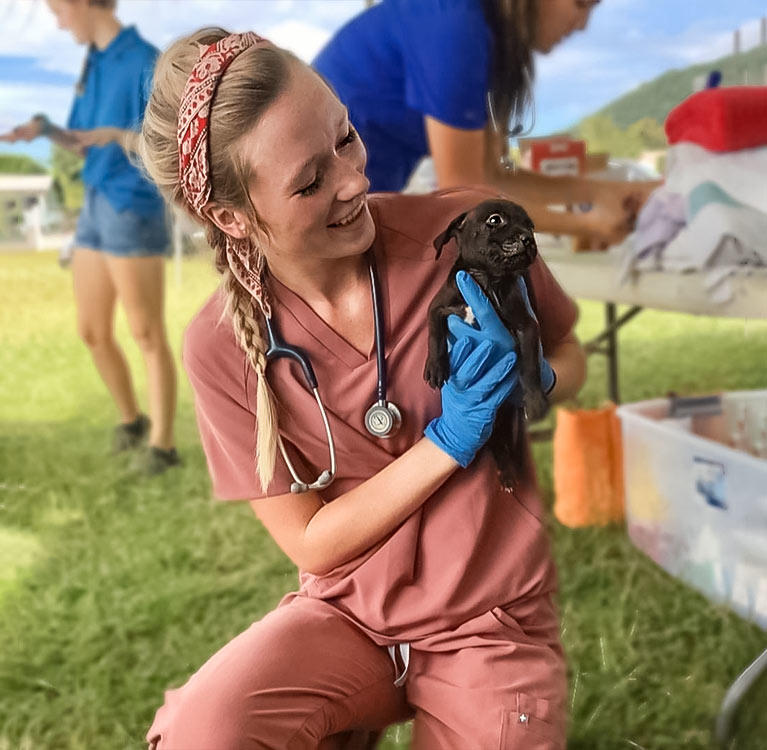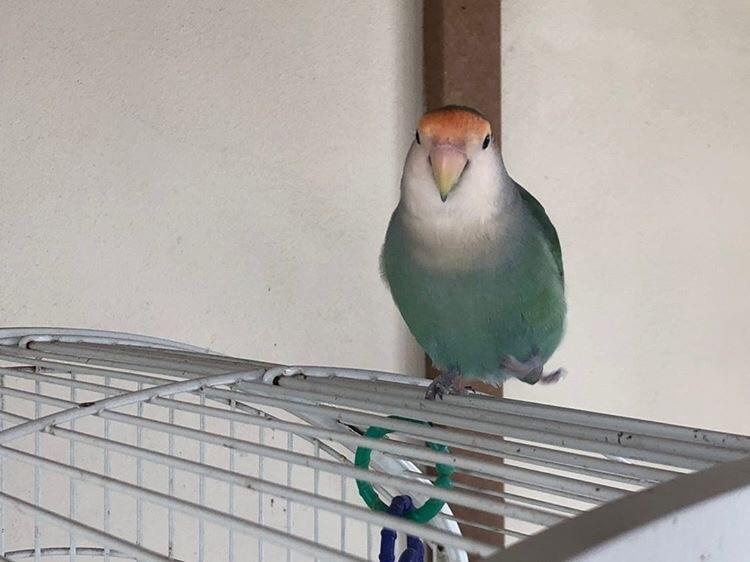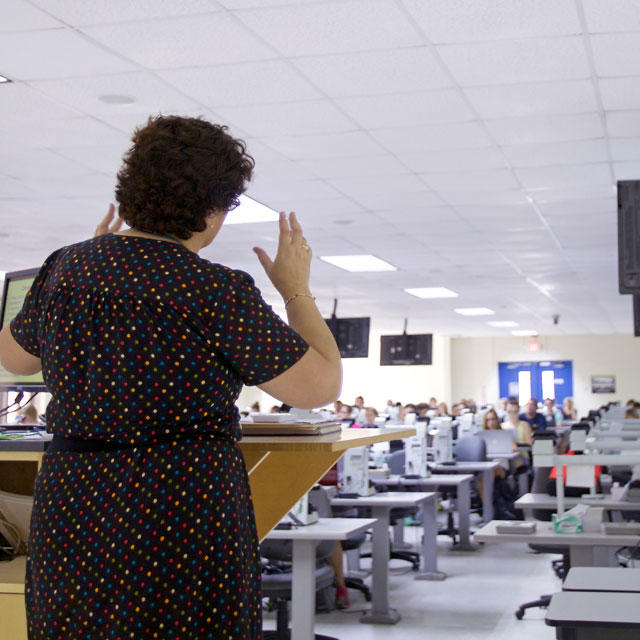Have you noticed your pet having trouble getting around the house, or has something unusual appeared on or around your pet’s eyes? Your cat or dog may need to visit an animal ophthalmologist—a veterinarian who specializes in treating eye disorders. Just like ophthalmologists for people, specialists in ophthalmology for animals perform exams and non-invasive procedures as well as surgery and therapy. They may correct, protect, or even restore an animal’s vision.
Students interested in becoming an animal ophthalmologist should be aware that it can be a long and rigorous—but rewarding—path. The path—at least 12 years of undergraduate study, veterinary school, internship, and residency—requires dedication and patience, as well as excellent grades and test scores. It also requires a desire to learn and the compassion to help animals live better and longer lives.
The steps to becoming an animal eye specialist are detailed below. Consider everything well—it is a big decision to start down the animal ophthalmology path. If you think you want to be an animal eye specialist, ask yourself some questions:
- Do you love animals—and science?
- Are you fascinated by animal anatomy—particularly the eyes?
- Are you ready to provide all aspects of animal eye care?
- Do you want a challenging and rewarding career?
- Do you want to combine veterinary medicine with surgery?
- Are you dedicated to providing comfort and relieving pain and suffering in animals?
- Are you an excellent student who wants to continue learning?
If you answered “yes” to one or more of these questions, then a career in animal ophthalmology may be for you.
What Do Animal Ophthalmologists Do?
General practice veterinarians can treat many eye ailments, but animals with more complicated, persistent, or serious conditions are referred to animal ophthalmologists. Veterinary eye specialists have specialized training after veterinary school, and they are skilled at a variety of exams, procedures, surgeries, and therapies. They commonly treat such conditions as:
- Cancer
- Cataracts
- Corneal diseases and ulcers
- Dry eye
- Eye infections, inflammations, and injuries
- Eyelid abnormalities
- Glaucoma
- Iris atrophy
- Lens instability
- Nuclear sclerosis
- Ocular and retinal diseases
- Retinal degeneration or detachment
- Tear film abnormalities
- Tumors
For many of these conditions, early diagnosis is crucial to successful treatment and recovery. Eye exams with veterinary ophthalmologists should be part of an animal's—particularly an older animal’s—routine wellness program. Regular exams for service or working animals—many of whom help people with vision problems—are also very important. Animal owners can do their part by paying attention to their animal’s eyes and looking for such eye irregularities and symptoms as:
- Corneal cloudiness or discoloration
- Dilated pupils
- Enlarged eyes
- Increased tear production
- Ocular rubbing
- Pain
- Redness
- Squinting
- Visible third eyelid
- Vision loss
Prior to an eye exam, a veterinary ophthalmologist will study an animal’s health history, medication, and symptoms. During exams and treatment, animal ophthalmologists pay close attention to an animal’s behavior, facial symmetry, and navigation. They test body temperature, intraocular pressure, and tear production, and they may perform stain tests that use colored dyes and lights to detect defects, deficiencies, foreign objects, or ulcers in the eye.
The eye doctors also test an animal’s reaction to abdominal, lymph node, and orbital rim palpation, globe retropulsion, and aggressive or menacing movement. An oral exam can reveal an abscess, infection, or other condition that may affect an animal’s vision. Genetic eye screenings are done for animal breeds—particularly dogs—known for having eye problems.
Many eye ailments require animal ophthalmologists to perform complicated surgeries, during which they may use operating microscopes and carbon dioxide and diode surgical lasers. The animal eye doctor’s other specialized equipment includes:
- Indirect headsets
- Ophthalmoscopes
- Phacoemulsification units
- Slit-beam biomicroscopes
- Transilluminators
- Ultrasound transducers
These tools help animal ophthalmologists diagnose and treat patients who are unable to say what is bothering them. Doctors determine a path of treatment and recovery by looking inside the animal’s eye. They test blinking, eyelid, optic nerve, and pupil reactions; and study the shape and texture of the iris and any associated inflammation.
Many who study animal ophthalmology treat more than just cats and dogs. Some work mainly with horses or with such farm and food animals as cows, goats, llamas, pigs, and sheep. Others work with such exotic and zoo animals as amphibians, birds, fish, rabbits, reptiles, ruminants, and rodents. Eye treatment varies according to the animal, and some veterinary ophthalmologists must have specialized training.
How Do You Train to Be a Veterinary Eye Doctor?
A veterinary eye doctor must first become a Doctor of Veterinary Medicine (DVM) by graduating from a veterinary school accredited by the American Veterinary Medical Association (AVMA)—such as the Ross University School of Veterinary Medicine (RUSVM)*. RUSVM runs an accelerated DVM program of 3.25 years, but most veterinary schools are four years.
The DVM must then complete a one-year veterinary internship or 12 months of private practice before entering an intensive three- or four-year residency in Veterinary Ophthalmology. Such residencies are sometimes focused on equine, exotic, or farm animals to allow doctors to specialize. Qualified candidates then pass a tough multi-day examination to be certified by the American Board of Veterinary Ophthalmologists (ABVO) and the American College of Veterinary Ophthalmologists (ACVO).
A Career in Veterinary Ophthalmology
Veterinary ophthalmologists may work in an animal clinic, farm, hospital, laboratory, university, or zoo, and some have their own private practice. They may have regular office hours or spend time travelling to visit animals on location. A vet eye doctor’s day may be spent evaluating and treating patients, but significant time is also spent in the laboratory and working with animal ophthalmology care team members—particularly technicians and trustworthy animal restrainers.
They consult with animal owners, primary care veterinarians, and other veterinary specialists. They also dedicate time to research, studying, and teaching—some board-certified veterinary ophthalmologists opt for academic positions instead of going into practice. Research in the causes and cures of animal eye diseases and disorders often helps further research in the treatment of eyes conditions in people.
Demand for Veterinary Ophthalmologists
In general, the career outlook for Veterinarians is positive overall. The need for veterinary ophthalmologists will always be present as treatment for eye conditions and eye injuries tend to be prevalent in all species of animals.
The Ross University School of Veterinary Medicine provides an accelerated*, broad-based curriculum that integrates unique research opportunities, classroom study, and hands-on clinical training. Take the next step on your path to becoming a veterinary ophthalmologist: apply for admission to RUSVM.
Related resources:
*Ross University School of Veterinary Medicine confers a Doctor of Veterinary Medicine (DVM) degree, which is accredited by the American Veterinary Medical Association Council on Education (AVMA COE), 1931 N. Meacham Road, Suite 100, Schaumburg, IL 60173, Tel: 800.248.2862. For more information please visit: https://www.avma.org/education/accreditation-veterinary-colleges.
The AVMA COE uses defined standards to evaluate veterinary medical education programs, including facilities, clinical resources, curriculum, faculty, student outcomes and research programs. The standards are interpreted and applied by the AVMA COE-accredited veterinary medical education programs in relation to its mission.






